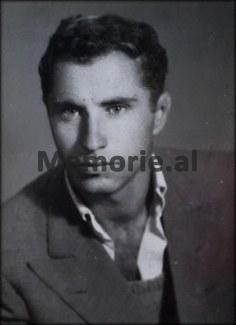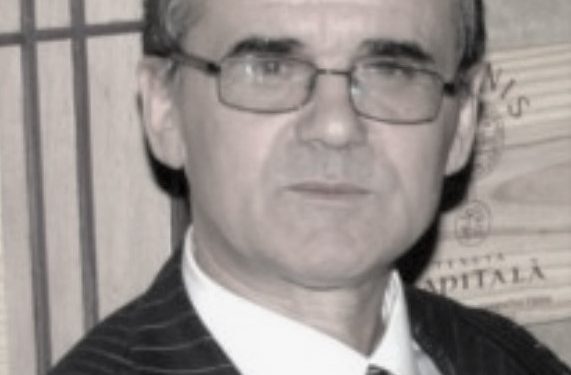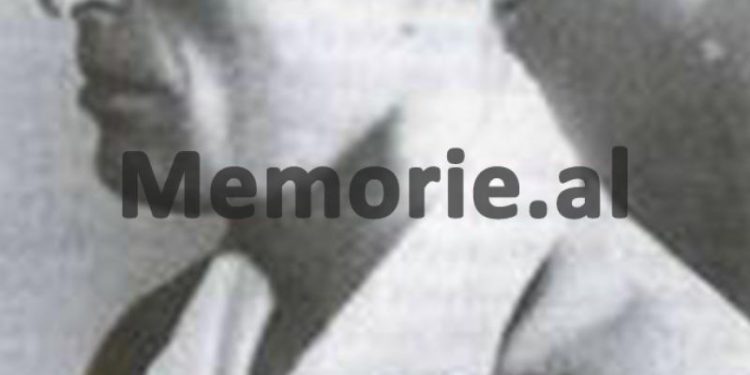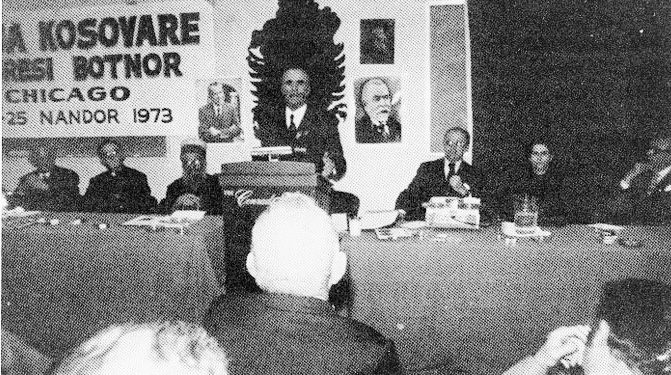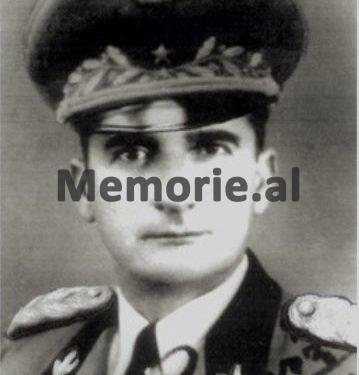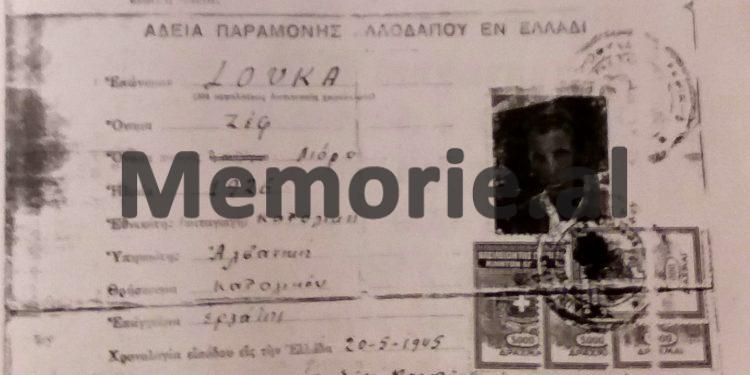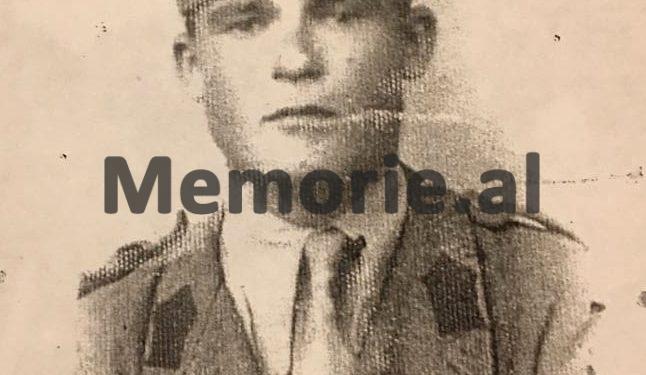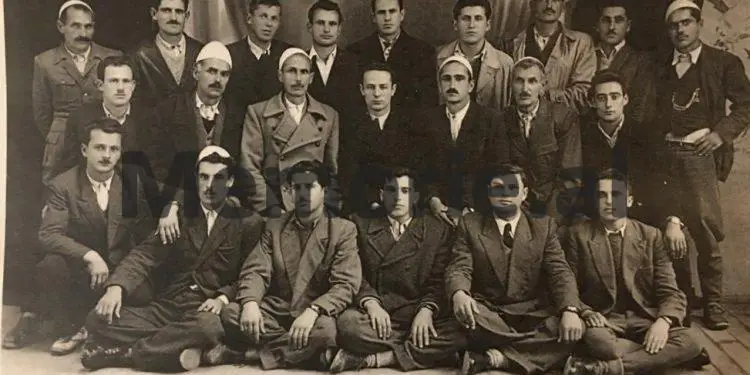By Dalip Greca
The first part
Memorie.al / Confessed for the first time by the USA, one of the paratroopers sent on a secret mission to Albania by the CIA, for the overthrow of the communist regime of Enver Hoxha. About the CIA and ‘Mi-6’ operation against Albania, Zef Luka, one of the few paratroopers dropped by the Anglo-American intelligence agencies, testifies from Cleveland, Ohio, USA, to overthrow the communists and who lived for 13 months in the mountains of Northern Albania, escaping the detachments of the Pursuit Forces, who, assisted by the Russians and Kim Philby, captured and killed most of the paratroopers. Zef Luka, Shkodran anti-communist who survived and did not fall into the trap set by the Albanian State Security, in cooperation with Russian counter-intelligence; (trap fed by Kim Philbit, the English double agent, who operated in Washington; later moved to the Kremlin, declared “Hero of the Soviet Union”). Zef Luka, the former paratrooper lives in Cleveland, Ohio, does not forget for a moment the comrades with whom he was connected during the difficult days of the anti-communist war. He has a model diary, which reflects in detail the activity of those, whom he himself calls “One hundred Albanians who came with me to bring freedom”. Zefi’s messages, to write about those who lost their lives in this war, have been frequent, but in a special way, he asked to write about the “professor”, Alush Lleshanaku.
Zefi asks that the truth be written and not conjecture; requires some of the events to be clarified, since misinformation, even unintentionally, distorts history and this is not in the best interest of the nation, the more that those who can testify are rare, because the “scythe” of death has mowed one after the other. Zefi is the only one alive among the paratroopers who landed at that time, in the mountains of Northern Albania, to overthrow Enver Hoxha’s regime. I got in touch with Zefi again on the phone, to listen to his voice and to get testimonies about Alush Lleshanak, whom he, like many of those who knew the professor, adored.
How did you meet Alush Lleshanaku and what can you tell me about his personality, as an intellectual and anti-communist fighter?
– I encourage him to speak on the other side of the phone, Zef Luka.
“What’s wrong, they said, brother. Alushi was one of those good Albanians whose nana was born only once. He loved Albania like his soul, more than his mother, whom he also loved and respected until death. As I wrote in my diary: “One hundred Albanians who came with me to bring freedom”, Alushi was the man to whom I was spiritually connected. Even when Ernest Koliqi proposed to take me to a school in Rome, I told him; ‘no’, why had I promised Alushi, to accompany him in the mountains, I would parachute like him”.
Mr. Zef, under what circumstances did you meet Alush Lleshanaku?
“It was March 1947, when we left Heraklion, Crete for Piraeus, Athens. We were stationed in the “Haxhi Qiriakion” camp, Piraeus. In the room on the second floor, there were many nationalist Albanians: Muharrem Bajraktari with his son, Esati, Fiqiri Dine with his son and brother, Hysni Dema, prof. Miftar Spahija, Abaz Ermenji, Tako Baqi, Alush Lleshanaku, me, while General Preng Previzi, had a separate room in the camp and came to us, only when there was an inspection, while he lived in the middle of Athens, in the “Bancion” hotel.
On the first floor, lived Asllan Zeneli with his nephew, Ramadan Cena, Dem Ali Pozhari, Bik Pazari with his brother, Ded Pepa, Lek Martini and Pal Marku. The cook was Dauti from Tirana. There I met Alushi and learned a lot about his life, even though I had heard his name well, from Shkodër. His father’s name was Shuaip. Pat left in Bradashesh of Elbasan, in 1913; he completed the ‘Normal’ of Elbasan and became a teacher with the help of his aunt, Sula”.
What did you talk about with Alushi on the first date, do you remember?
“He was sweet in conversation, pleasant, wise. I remember that I told him in that meeting: You are our pain to the youth of Shkodra and to the communists, who were your students, when in December 1944, “Zani i popullit” wrote that you were ambushed, drowned in Drin and that they found the automatic machine, on the edge of the river”. He listened to me attentively and it was not difficult for him to discover that feeling of pride, which slept for him in my soul…! All the time, Alushi was quick to pick up and lead us in the morning gymnastics at the camp. I remember that when the police officer came, at 9 o’clock, a small list of young people was presented to him, and together with Alushi, we asked him for permission to go to the sea to bathe.
Alushi had a muscular body, he looked like an artist. In the sea, the Greek children surrounded Alushi and called ‘Tarzan’, while they called me, his son. One day, when we were at the beach, we had a conversation, just alone with Alushi. Alushi asked me: – Zef, I fell to Albania with a parachute, are you coming with me?
Although the proposal was immediate, Zefi still remembers that moment, when, without thinking at all, he boldly answered: “How come Alush! We are all waiting for that day”, – I told him and promised him”.
…The voice on the other side of the phone was silent for a few moments. He must have passed out, I thought, and to get his attention, I asked: Did I bother you in the conversation? How are you, Mr. Zef?
“You know, man, that I never complain…! I’m fine, – he added after a while…! – Listen and write”, – Zef Luka recovered, on the other side of the phone: – “I asked Alushi one day: What did you have to do with Enver Hoxha, did you fall into his hands? Do you know how he answered me? “They put me in a cage and I had them walk around Albania, but they didn’t kill me, so that they could see and understand their mistake.”
– “Alushi was the first to parachute in Albania,” says Zef Luka. – From October 1948, until February 15, 1949, Alush Lleshanaku, Xhevdet Blloshmi, Ndue Pjetër Gjomarkaj and Ndue Mëlyshi continued to fall in Albania. Rome pulled them from the Greek camps, through the lawyer Cirkios, and then, from Italy, they were parachuted. It turned out that during the landing, they lost the radios with which they were going to contact the center. This was the reason that Alushi, together with Xhevdet, left Albania and went back to Greece, while Ndue Pjetri and Ndue Mëlyshin found the radios, but they could not connect with Rome, so they were forced to go to Yugoslavia”.
“When did you meet Alush Lleshanak again”? – I direct the conversation in the direction that interests me.
“In March 1949, with a Greek transport ship, we left from Piraeus to Bari, to the Santa-Fara camp. When we got there, they provided us with an index card and a control book. They had divided us according to religion; we Catholics in separate rooms, as were the Orthodox, Muslims and Jews. Since I was fluent in three languages and there were many Albanians in the camp, Lec Tusha, who in the time of Italy had been a forest officer and was a translator in the camp, says to me: ‘Zef, I have found you a job that suits you. Will you work in the camp library?
I started there and I was satisfied, because I was well paid. It was there that Eduart Liço came from Rome, who would later become the editor of the newspaper “Dielli”, the newspaper of “Vatra”. This one takes pictures of us there in the camp. As he told us, he was sent by the “National Independent Bloc”. At this time, Alush Lleshanaku and Xhevdet Blloshmi also came from the Italian capital. It was learned from them that there would be movement in the camp and that a person would come to take the Elbasan and Shkodra groups. Meanwhile, Gjon Gjinaj and Pashko Lekaj secretly left for Rome. Here I met again with Alushi, who, as I have often repeated, I have seen as a spiritual leader in my actions to overthrow communism”.
During your life in the migrant camps, do you remember if you met the nationalist leaders who operated in exile?
“Of course, with Abas Ermenji and Mit’hat Frashëri, several times in Greece and Italy. When we were in Santa Fara, Mit’hat Frashëri came to pay us a visit. He met us separately, the Shkodra group. He seemed to come from a good strain, a good house, as we say; Goyambal, quiet and brave. Most of the immigrants who came from Greece to Italy were recruited as volunteers in Albania. Ours were determined and brave, each one was sworn to overthrow communism”.
What memories do you have of Camp Santa Fara?
“Lots of memories. It was a transit camp, where the “Free Albania” Committee and the “Independent Bloc” were members, and of course the legalists. These attracted groups of volunteers, who threw them in Albania, to create a favorable situation for the overthrow of Enver Hoxha’s regime. Ethem Chako’s group, as is known, is one of those who were captured alive. After some time, Hamit Toshi (Saiti) told me that he was going to volunteer in Albania, but without our friend, Osman Dervishi, (the three of us ran away from Greece together.) He asked me: Yes, you wouldn’t you? To come?!
-‘I have given my word to Alush Lleshanak, I have given my allegiance to him since Greece’. This is where the three of us parted ways; Osman Dervishi immigrated to Australia, while we continued to dream and work, risking our heads, to overthrow communism. We also had Besim Kusi in the camp. He worked as a tailor in the camp, he had his own room. One day, he calls me and says: – Zef, I heard that you want to go to Albania; you want to jump with a parachute in the mountains, is this true or false? – Yes, take it, I tell him. It is true. – ‘Don’t be a fool’, – he replies to me. – I have decided, – I tell him. – ‘I’m telling you a tale’, – he starts, in a last effort, he turned my mind around:
‘There was a general going to war. This, the general, stops at a mill to drink water. Mullisi says to him: You river, you are so well dressed, with all those moles (grades). The general, whom the soldiers were waiting for outside, returns it to the miller, do you have it right? – Yes, – says the mullisi, who saw with envy, both the uniform and the ranks of the general. – The general proposes: – Shall I take off your clothes, and I will give you mine? – Agreed, – says the mullisi and takes off his clothes and puts on the general’s. As the tusks were changed, the miller put his helmet on his head, wearing the general’s uniform, jumps on his horse and goes to the front of the war.
Rifles crackle on the war front and a bullet hits the general (actually the miller) in charge. Two soldiers approach him and say: The bullet fell on his head, but the miller, who was on the verge of death, answered him: The one who stood at the mill had the head, not me who became a general, to take the grain of lead… ! Even after this tale-telling, I did not change my mind, to follow the example of Alush Lleshanak, in overthrowing communism”.
Were there times when the nationalist boys, who had decided to risk their lives for the overthrow of the communist regime in Tirana, wavered from their ideals?
“No, I can’t say that. Everyone was determined, but there were occasions when we even had a good time. For example, Bardhok Gjata, who belonged to Mirdita’s group, worked outside the camp. He wanted to marry an Italian woman, but he didn’t want to move to Albania. Young boy. Gjon Gjinaj laughed, singing the song: “Well, you know who we’re marrying… Nana marries her own son, for fun and for fun…”! Faced with this humor, which was often repeated, Bardhoku decided to come to Albania…”!
When did your group land in Albania?
“I am telling the events in order, as they happened, as I have saved them in my diary. It was August 1949. We were in Bari, Italy. The camp gate guard informs me that someone was looking for me outside. When I go out, I see a person in a black car, while in his hand I could see a watch and a thick gold bracelet. He asked me what my name was. When I told him, he ordered me to take my friends and show up at the ‘Delle Nacioni’ hotel, via Lungo Mare. We went there. They put us in a hall. They called us names and gave each of us 40,000 lire. As soon as it got dark, they put us in a truck and drove us away. We settled in a military fortress, in Monte Mesela. From behind, we were accompanied by that person in a car, who was called Conte Caropio.
When we went to Monte Mesola, we found a group of those who were going to land in Albania. There I met Alush Leshanak again, as well as Gjon Gjinaj, Pashko Letajn, Col. Çunin, Col. Bib Mirakajn, Xhevdet Blloshmi, etc. It seems that all three groups would be thrown. The group of Mirdita and Shkodra, which included; Kol Çuni, Gjon Gjinaj, Pjeter Gjoci, Bardhok Gjeta, Ndue Frisku, Mirash Marku, Nikoll Marku, Pashko Leta, and me, Zef Luka. Meanwhile, Elbasan’s group consisted of Alush Lleshanak, Halil Hoxha, Rexhep Kasa, Zenel Çela, Nuri Plaka, and Abedin Xhango. The third group, from the same district, consisted of Xhevdet Blloshmi, Shyqyri Biçaku, Isa Kallos, and Kamber Alla”.
Were you prepared to deal with parachuting, difficult mountain life, diversionary warfare, the use of radio transceivers, etc.?
“Some were qualified. Thus, for example, Col. Chuni was qualified for radio, since during the German era; he had served as a radio operator. Alush Lleshanaku also learned about radio. He also trained us how to parachute, how to shoot on target. There in the camp, they taught us code, took and gave me radio, etc.”
After that, were you immediately sent to Albania, or were you taken to some other training place?
“In December 1949, they dressed us as sailors and from Monte Mesola-Tarantos, they moved us on a bus to Rome, to Fraskati, via Violata, Vila Rossa”.
Who consisted of the Albanian pariah, who took care of the groups that would be thrown in Albania? Did you contact them before you left for landing?
“Once a week, Ismail Vërlaci, Gjon Marka Gjoni, Ndue Gjon Marku, Lin Shkreli, Xhafer Deva and Ernest Koliqi visited us.”
Did you have a chance to communicate with any of these exponents?
“Yes, one day Ernest Koliqi pulled me aside and said: ‘I know my father, and I found a wife with him, I don’t know what they told me. If you don’t feel like you’re capable of going, tell me to stop here, and I’ll get you a scholarship for school.’
– No, – I told him, – because I gave my word to Alush Lleshanak already in Greece…”!
What was the individual weaponry, for each of you?
“A small paratrooper ‘Car’ (rifle type), a magazine of 25 cartridges, 6 magazines of 50 cartridges, we had 500 cartridges in reserve, and two hand grenades each. We each had a beret in two pockets under our pants. In addition to these, we also had food, medicines, and vitamins for 5 days, etc.”
Can you recall the moments when you jumped with a parachute?
“Of course, where those moments are forgotten! It was December 26, 1949, the second day of Kshnella. At 4 o’clock in the afternoon, a bus comes to pick us up and take us to the field of the Cento Celle military airport. I remember that there, we boarded a twin-engine plane, which was not taking off, because two people were expected to arrive, who were responsible for our mission. They came after a while; they were dressed in black clothes, and their car was also black. I don’t know why, the color black possessed them. They inspected us with a glance each. The plane took off. Conte Coropi, who accompanied us, opened a bottle of cognac and offered it to us. I didn’t drink. After some time, the pilot told us that we were over Shkodër. From above we could only see a cluster of lights, nothing else was visible. – ‘As soon as the siren sounds, you will all come out’, – ordered the Italian.
We all lined up. The large package with our belongings was in front of the plane door. Pashko Leta was in charge. As the door opened, on one side were Conte Corpio, and another officer. Pashko Leta’s siren sounded, she pushed the big package and Kola came out, who hesitated for a moment, but I pushed him, the officers also pushed him. When I jumped, it seemed to me that the tail of the plane was falling on my body. I hear a noise; one of the bags was running away at the speed of a bullet. What I felt in those moments; it seemed to me that my eyes were filled with air. The parachute opened, I exploded the package on my chest, in which the radio generator was placed. Even the parachutes of my friends, I could see that they were open and quickly headed for the ground. We were so close to the ground that I could hear the dogs barking below and could see the lights of the houses.
The wind pushed me towards the forest of Komi. The descent, in fact, had to be made in the Meadows of Surroi. Feet began to touch, pine needles. I covered my eyes with my hands, so as not to be blinded by the pine needles. When I was waiting to touch the ground, I see myself hanging 50 meters. I grabbed a spruce branch, approached the thick branch, burst the parachute and touched the ground, breathing a sigh of relief. It had snowed. I remember that the thickness was almost a snow sock, as we say in Shkodër. It was a beautiful night. Hana shone like sunlight. A strong contrast of its rays, shining on the white snow. Searching, I found the parachute in which I had the car and generator inside.
Before I landed, I saw a parachute not far from me. The white one belonged to Kol Chun’s radio. Indeed, care had been taken that the radios and generators were in white parachutes, while the others were in the color of foliage. This was done because Alush Lleshanak’s group had suffered in the first landing, because they could not find the radios and generators, they could not connect them, and as a result, the mission failed; a part went to Greece, the rest to Yugoslavia. Neyse, running towards the white parachute, I hear a voice: – Who are you? – Cough, I’m Zefi, – I say.
He too had been left hanging, like me, a few moments before. – Come help me, – he calls me. – Help me, – I say. – Fly and grab the nearest branch and explode the parachute! – While I found Kola’s radio parachute, I hear it fall to the ground, but I faint. I took snow and put it on his face. After he came to his senses, I said to him: – Take out the revolver, – because his car was owned by Pjeter Gjoci, who had taken it, so that Kola would not be burdened more. I had not accepted, he charged them with my ‘Car’. – I want him with me, – I told them.
How did you connect with each other? Did you wait for breakfast or…?
“Before we boarded the plane, we were given two whistles that whistled like birdsong. I whistled, but no one answered me immediately. Maybe it was the fault of my ears, which were heavy and still buzzing from the noise of the plane. Worried, I tell Kola, that no one is answering me. I told him that I will take down a ‘Beret’. I shot a rifle, but no one answered me. In fact, we were ordered not to fire our rifles, but to wait 24 hours before joining each other. But I took out the ‘Car’ and shot it. In this case, someone answered me”.
How did the landing go, did you make contact with the Pursuit Force?
“At the moment of landing, no. Something didn’t make any kind of noise.”
When did you connect with the Center?
“At 9 o’clock in the morning, which took us to Albania. We were at Qafa e Lari, when Kol Çuni contacted Roma, who answered without numbers: “Brunë”.
What did this word mean?
“He wanted to say: I am grateful to you”! Memorie.al
The next issue follows




